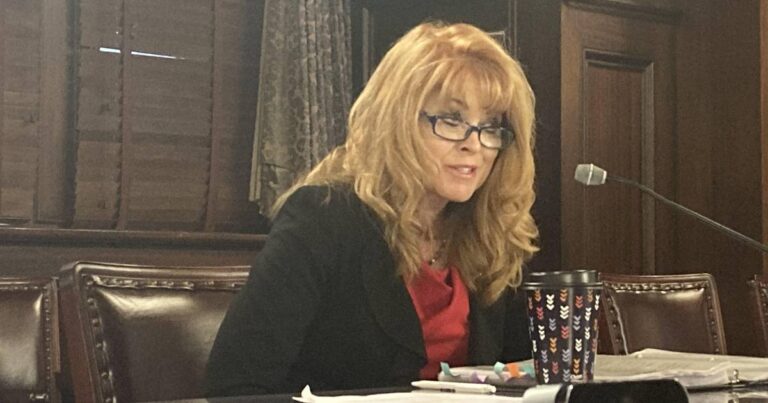
HARRISBURG — Small businesses in Pennsylvania are getting hammered by shipping price increases, consumers are spending an average of $3,000 more a year on food and gas, and if economic things “really explode” there is no guarantee the U.S. government can come to the rescue of the state.
These forbidding snippets were all part of testimony Thursday to the House Republican Policy Committee as it continued hearings on inflation.
It was the second day in a row average gas prices in Pennsylvania topped $5 a gallon. AAA listed the state average Thursday at a record $5.05.
In April, the U.S. inflation figure was 8.3%, close to the highest rate in 40 years.
The worrisome economic descriptions given Thursday came against a backdrop of a Pennsylvania government flush with cash and in possession of about $2 billion of federal American Rescue Plan Act money.
What will happen with that money is likely to be decided in coming weeks in talks between Democratic Gov. Tom Wolf and the Republican leaders of the Legislature.
Republicans generally want to be cautious with the money — Treasurer Stacy Garrity testified Thursday a “fiscal cliff” looms in the near future — while Wolf says so many people are hurting financially the state should send out checks up to $2,000 to many households, using the ARPA money.
In a tweet Wednesday, Wolf wrote, “Tell the Republican-led legislature to stop wasting time and get this money out now.”
A testifier on Thursday, Veronique de Rugy, a tax and fiscal policy researcher at George Mason University, said it would behoove states to be ready financially for bad times.
“If things really explode and your state has a really big problem, it is not always a given that the federal government is going to be able to come in, step in and bail states out,” de Rugy testified. “States have a huge role to play in addressing fiscal sustainability.”
Pennsylvania recent, big surge in revenue was dissected by a testifier at Wednesday’s first hearing, Matthew Knittel, director of the Pennsylvania Independent Fiscal Office.
Knittel noted that the categories of tax revenue that had made the biggest percentage increases were those tied to things like capital gains, dividends and business profits.
Speaking after the hearing, he said that while people making money in those areas are doing well, “Folks on the lower end are seeing something very different.”
Garrity’s testimony created a picture, using numbers, of what inflation is doing to Pennsylvanians.
The average price of durable goods like appliance and furniture has increased about 14% in the past year, she said.
And sharp increase in the costs of food and gasoline mean, on average, people have to spend $2,000 more a year on gas and $1,000 more a year on food, according to Garrity.
“The people are paying $3,000 here more on food and gas. They are not putting that money toward other things. They are not spending that $3,000 on entertainment and clothes. They are not spending that money on your home do-it-yourself projects,” Garrity testified. “And they certainly are not saving it for the future. And we all know costs like this hit hardest on the people who can least afford it.”
She said she believed “the negative impact of the current high rate of inflation will extend well into the future.”
Both Garrity and Greg Moreland, state director for the National Federation of Independent Business, highlighted the impact of record diesel fuel prices on the state economy.
Diesel fuel powers nearly all construction-related vehicles and nearly all trucks that carry goods on highways to stores.
Garrity said the price in December, 2020, was $2.50 a gallon. On Thursday, AAA data listed the Pennsylvania average as a record $6.19 a gallon.
:quality(70)/cloudfront-us-east-1.images.arcpublishing.com/tronc/MU3BKPFIGNDB7IAA47TXV4P3UA.jpg)
“The rise in diesel is crushing our members,” Moreland said. He specifically said the rises in shipping costs have been “drastic.”
The average small or independent business in Moreland’s organization has 10 employees. He testified that a recent survey of the 13,000 members showed 32% of them classified inflation as their number one problem.
That is the highest percentage in the past 41 years of surveys, he said.
Rising interest rates — triggered by the Federal Reserve actions intended to fight inflation — also are causing worry for small businesses that need to borrow money, he said.
Inflation, he said, is forcing some small businesses “to close their doors forever.”
President Joe Biden has said it is “not true” that larger government spending fueled the current inflation surge.
Last Call
Daily
Get top headlines from The Morning Call delivered weekday afternoons.
On Thursday, de Rugy, the George Mason scholar, testified to lawmakers that she disagreed.
In particular, she singled out the $1.9 trillion ARPA package approved by the federal government in early 2021. At the time, de Rugy said, national output was growing and unemployment was falling, so a big-spending federal package was not appropriate.
It helped trigger the inflation being seen now, de Rugy said.
As evidence, she pointed to the recent rise of inflation in Europe, which she said was largely the result of soaring natural gas prices caused by Russia’s invasion of Ukraine.
Removing food and energy costs, she said, so-called “core inflation” in Europe is only 3.8% compared to 6.5% in the U.S.
“Big difference,” she said, indicating U.S. policies are to blame for that difference.
Morning Call Capitol correspondent Ford Turner can be reached at [email protected]